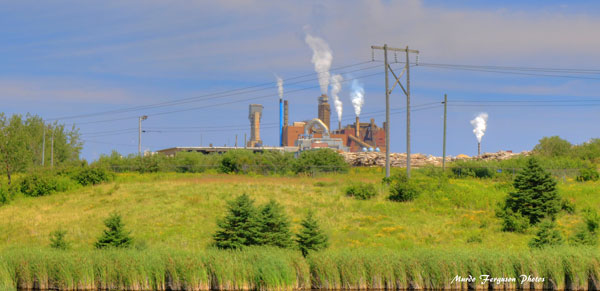
News
Pulp
Water & Chemicals
Northern Pulp to close after N.S. premier says ‘no extension’ [UPDATED]
December 20, 2019 By Kristina Urquhart
 Northern Pulp. Photo: © Murdo Ferguson/Paper Excellence
Northern Pulp. Photo: © Murdo Ferguson/Paper Excellence Northern Pulp has announced it will close, eliminating 300 direct jobs, following the Nova Scotia premier’s announcement earlier today that the province’s January 31 deadline to stop diverting effluent into Boat Harbour will stand.
During a press conference this morning, Premier Stephen McNeil said the mill and its parent company Paper Excellence have had enough time to come up with a new plan.
“Northern Pulp will be ordered to stop pumping effluent in Boat Harbour, and let me be clear, there will be no extension,” McNeil said. “The mill has had a number of chances to get this right.”
In a subsequent news conference, Brian Baarda, CEO of Paper Excellence, confirmed his previous statement that the Abercrombie-based Northern Pulp will close without an extension to the Boat Harbour Act. The mill is the province’s main consumer of sawmill residuals.
“This decision ensures the closure of Northern Pulp [and] the devastation of Nova Scotia’s forest industry,” Baarda said. He indicated he would be meeting with mill staff today. Counselling will be available as layoff notices are distributed.
“I was hoping it wouldn’t come to this,” McNeil said about the decision. “I am extremely disappointed to say the least.”
Support for workers
McNeil also announced a $50-million transition fund to support forestry workers who will be displaced by the government’s decision. Kelliann Dean, deputy minister of intergovernmental affairs and trade, will lead the team responsible for administering the funds.
McNeil indicated the funds would be available to most workers in the forestry industry – aside from mill owners – including Northern Pulp employees, truckers and contractors.
Northern Pulp employs 300 people at its plant, and there are an estimated 2,700 forestry workers in the supply chain that could be out of work when the mill ceases operation, even if temporarily.
A visibly emotional McNeil acknowledged the timing of the announcement being close to the holidays. “We have not forgotten you,” he said, addressing the workers. “Our government is committed to economic growth and environmental integrity. We will continue to do both, not an either or.”
McNeil said that as part of the transition process, his government would be examining Northern Pulp workers’ pension plans to ensure they wouldn’t be cut short.
Clean-up timeline
Nova Scotia passed the Boat Harbour Act in 2015, allotting five years for the kraft pulp mill to implement an alternate plan for its wastewater treatment. The current system deposits untreated effluent into lagoons at Boat Harbour, which is adjacent to Pictou Landing First Nation. Decades of deposits by previous mill owners have made the area one of the most polluted in the region.
Earlier this year, Northern Pulp submitted an environmental assessment to the province for its new AST system, which would see 85 million litres of treated effluent per day routed through a 15-kilometre pipeline into Northumberland Strait.
But that assessment was protested by local environmental groups – and lacked sufficient scientific information, according to the province.
Northern Pulp submitted a follow-up focus report on Oct. 2, with additional third-party assessments that indicated the mill’s proposed Activated Sludge Treatment (AST) system would deliver diffused, treated effluent and would not have adverse effects on the fish or environment.
On Dec. 17, Nova Scotia Environment Minister Gordon Wilson announced the focus report was incomplete, and requested Northern Pulp complete another environmental assessment report.
The new report must include additional environmental data focused on the health of the fish, air and water. The exact requirements will be outlined by the province on Jan. 10. After that date, Northern Pulp will have two years to complete the assessment.
In the meantime, clean-up efforts will begin.
McNeil said that once the January 31, 2020 deadline passes, the federal government must complete an assessment of the state of Boat Harbour, which will take two years. Then the physical work can commence.
The federal government has committed $100 million toward remediating Boat Harbour, and Nova Scotia has also announced $100 million in clean-up funding.
Uncertain future for forestry
McNeil said that while he felt Northern Pulp has cooperated with regulators, the mill hasn’t moved quickly enough.
“My commitment to clean up Boat Harbour was a serious one,” he said. “We believe five years was enough time for us to get to a different solution than today.”
McNeil urged the company to find a way to continue operating in Nova Scotia – but without an operational wastewater pipe, the mill will still close on Jan. 31, pulling 280,000 tonnes of kraft pulp out of the market annually.
The premier said work can still continue on submitting the additional environmental assessment report.
McNeil stressed the need for the province’s forestry industry to diversify, saying sawmills will need to work to find new customers for residuals and look to international markets such as Europe for exports of softwood chips.
New biomass plants coming online in the region over the next year could also take some of the residual chips.
McNeil said there is still a future for Northern Pulp in Nova Scotia if the company can ensure a modern mill that meets the province’s environmental regulations, and if the province’s supply chain can work together on building a new future for the industry.
“It is my hope that the mill will recognize that we want them in the sector,” he said.
For more background on Northern Pulp’s proposed wastewater system, read our recent feature Pipe or #NoPipe?
Print this page